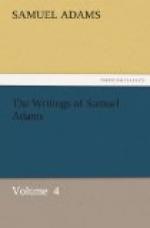Boston Novr [21] 1781
SIR
The Bearer of this Letter Mr Edgar called on me the other Day with General Baylie of Vermont a Gentleman of undoubted Integrity & Attachment to the Cause of our Country & [who] has renderd himself very useful by the Intelligence he has obtaind from Canada since the Beginning of this War, & is well known to the Commander in Chief of our Armies. Genl Bay-lie earnestly wishes that Mr Edgar may be introducd to Head Quarters because he thinks from what he has to say it will appear that if two Gentlemen who are now Prisoners in Canada whose Names he will mention to you may be exchangd they will be able to make a full Discovery to you, of the Plan of union which he says is actually compleated between the Govr of Canada & the principal Leaders in Vermont. One of these Gentlemen General Baylie tells me he has long been acquainted with & confides in. It is possible you may be already sufficiently acquainted with this Matter; & there may be a Scheme of Policy on our Side which has not come to my Knowledge. In this Uncertainty I hope I shall be excusd troubling you with this Letter.
Mr Edgar, according to his own Account was in the British Service on the Lakes in 1774, afterwards was at Detroit as a private Trader, when he renderd Services to Colo Clark as an Intelligencer, became suspected he was sent a Prisoner to Montreal where he lay in Irons nine Months, & after two years Imprisonment, he made an Escape.
After congratulating you on the Divine Blessing afforded to the Allied forces under the Direction of his Excy Gen1 Washington, I am &c
The town of Boston to the selectmen of other towns.
[Ms., Chamberlain Collection, Boston Public Library.]
GENTLEMEN
The Inhabitants of the Town of Boston legally assembled, have taken into Consideration a Matter which they conceive all the other Maritime Towns in this & the Neighboring States are equally, and some of them more nearly interested than they. It is the Subject of the Fishery, and the great Importance of a Common Right therein being secured to the United States, whenever a Treaty of Peace shall be concluded. To flatter our selves with so happy a Prospect, so far as to neglect the necessary Preparations for another vigorous Campaign, would indeed be unbecoming the Wisdom of Americans; and yet, so important has been the Success of the allied Arms, the last year, that it would seem to be Madness in the Extreme for Britain any longer to persist in her unrighteous Claims. But Wisdom has forsaken her Councils.




